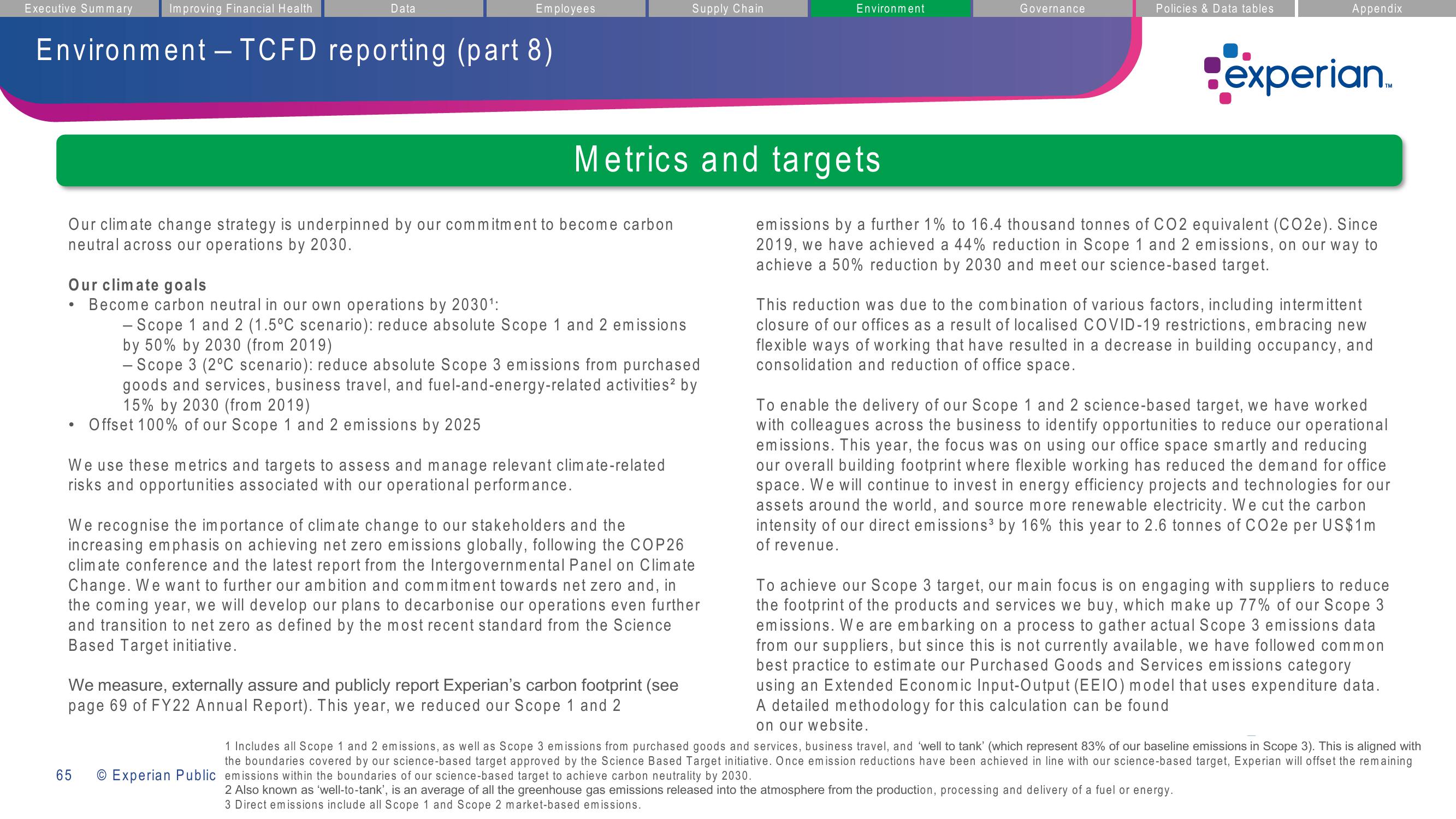Experian ESG Presentation Deck
Executive Summary
Environment - TCFD reporting (part 8)
Improving Financial Health
●
Data
Employees
Our climate change strategy is underpinned by our commitment to become carbon
neutral across our operations by 2030.
Our climate goals
Become carbon neutral in our own operations by 2030¹:
- Scope 1 and 2 (1.5°C scenario): reduce absolute Scope 1 and 2 emissions
by 50% by 2030 (from 2019)
- Scope 3 (2°C scenario): reduce absolute Scope 3 emissions from purchased
goods and services, business travel, and fuel-and-energy-related activities² by
15% by 2030 (from 2019)
Offset 100% of our Scope 1 and 2 emissions by 2025
65
Metrics and targets
We use these metrics and targets to assess and manage relevant climate-related
risks and opportunities associated with our operational performance.
Supply Chain
We recognise the importance of climate change to our stakeholders and the
increasing emphasis on achieving net zero emissions globally, following the COP26
climate conference and the latest report from the Intergovernmental Panel on Climate
Change. We want to further our ambition and commitment towards net zero and, in
the coming year, we will develop our plans to decarbonise our operations even further
and transition to net zero as defined by the most recent standard from the Science
Based Target initiative.
We measure, externally assure and publicly report Experian's carbon footprint (see
page 69 of FY22 Annual Report). This year, we reduced our Scope 1 and 2
Environment
Governance
Policies & Data tables
Appendix
experian
emissions by a further 1% to 16.4 thousand tonnes of CO2 equivalent (CO2e). Since
2019, we have achieved a 44% reduction in Scope 1 and 2 emissions, on our way to
achieve a 50% reduction by 2030 and meet our science-based target.
This reduction was due to the combination of various factors, including intermittent
closure of our offices as a result of localised COVID-19 restrictions, embracing new
flexible ways of working that have resulted in a decrease in building occupancy, and
consolidation and reduction of office space.
TM
To enable the delivery of our Scope 1 and 2 science-based target, we have worked
with colleagues across the business to identify opportunities to reduce our operational
emissions. This year, the focus was on using our office space smartly and reducing
our overall building footprint where flexible working has reduced the demand for office
space. We will continue to invest in energy efficiency projects and technologies for our
assets around the world, and source more renewable electricity. We cut the carbon
intensity of our direct emissions³ by 16% this year to 2.6 tonnes of CO2e per US$1m
of revenue.
To achieve our Scope 3 target, our main focus is on engaging with suppliers to reduce
the footprint of the products and services we buy, which make up 77% of our Scope 3
emissions. We are embarking on a process to gather actual Scope 3 emissions data
from our suppliers, but since this is not currently available, we have followed common
best practice to estimate our Purchased Goods and Services emissions category
using an Extended Economic Input-Output (EEIO) model that uses expenditure data.
A detailed methodology for this calculation can be found
on our website.
1 Includes all Scope 1 and 2 emissions, as well as Scope 3 emissions from purchased goods and services, business travel, and 'well to tank' (which represent 83% of our baseline emissions in Scope 3). This is aligned with
the boundaries covered by our science-based target approved by the Science Based Target initiative. Once emission reductions have been achieved in line with our science-based target, Experian will offset the remaining
O Experian Public emissions within the boundaries of our science-based target to achieve carbon neutrality by 2030.
2 Also known as 'well-to-tank', is an average of all the greenhouse gas emissions released into the atmosphere from the production, processing and delivery of a fuel or energy.
3 Direct emissions include all Scope 1 and Scope 2 market-based emissions.View entire presentation